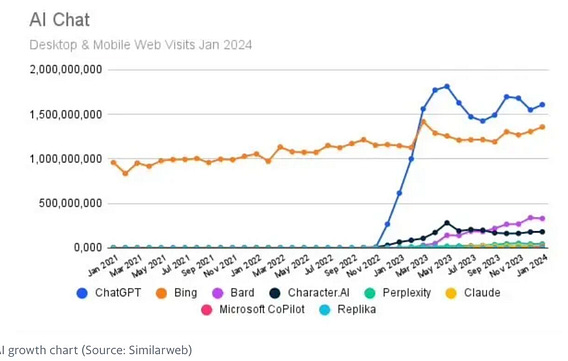The app for independent voices
ChatGPT's growth has stalled. Flatlined one might say.
Visits per month in Jan 2024 were roughly the same as 6 months earlier.
The question is why is this happening?
I acknowledge that I'm an outlier. In the past week, I have used ChatGPT 26 times, Claude 43, and Perplexity 34 . My longest work sessions tend to be with Claude. So my use has increased to roughly 15 queries of some length per day.
I undertook roughly 500 Google queries in that week (but that includes super lazy currency conversions and going to google search to type a website name.)
If I filtered out trivial queries from Google search, I would probably do 100 harder ones per week. It shows how far LLMs have gone to capture a share of my tougher enquiries--roughly half, maybe more.
Why might ChatGPT use be flatlining?
It might show the limitations of the alluring chat interface. It looks simple but to get work done, you need to understand what you are looking for and how you can iteratively get the machine to help you. As I discussed with Ethan Mollick, it takes 8-10 hours to get reasonably good at using an LLM for real work.
That is not an easy ask. Ten hours is a long time. A human can learn to drive a car legally with about 20 hours of practice. Imagine if a iPhone game took you 10 hours to figure out how to play. Not figure out how to win, but figure out how to play! They typically take 1-2 minutes--and for good reason. Even the gnarliest strategy games like Civilization take a few rather than several hours.
Visiting ChatGPT for the first time gives many people a "Now what?" moment. What am I meant to do know? Anything? Something? Nothing?
It's confusing.
This doesn't seem insurmountable. It seems like a question of product design. What are the types of hooks that help users onboard this app? That might not be a priority for firms building LLMs, like OpenAi and Anthropic, as they have b2b businesses, too.too.soTo test whether this type of knowledge engine has consumer legs, we might need to look at other companies. Mustafa Suleyman's Inflection felt it couldn't get there and bowed out. But Aravind Srinivas's Perplexity or Richard Socher's You might be better examples.
These founders have hitched their wagons to the consumer experience. Perplexity offers topical news briefs, giving end users reasons to visit many times a day. (I don't use the news briefs, but I do use Perplexity daily).
For other firms implementing LLMs, this is a lesson. User onboarding still counts, regardless of whether your user can just "talk to their computer." If ChatGPT or Claude are to grow, their masters might want to think less about plug-ins and tools and more about user onboarding and getting people up a learning curve far faster than today.
For those who put in the hours, 8-10 of them, one bad Netflix season, the return from having a cognitive sparring partner will pay dividends. Would love your thoughts below.
Initial data from Alex Kantrowitz who wrote this up really well.

